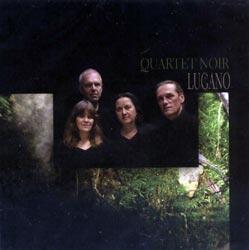
24.10.05
 Em 1998, o Quartet Noir – Urs Leimgruber (saxofones tenor e soprano), Marilyn Crispell (piano, percussão), Joëlle Léandre (contrabaixo) e Fritz Hauser (bateria) – deu um concerto no festival de Victoriaville, no Canadá. Editado pela Victo no ano seguinte, o disco ficou para a história como um dos grandes registos da década de 90.
Em 1998, o Quartet Noir – Urs Leimgruber (saxofones tenor e soprano), Marilyn Crispell (piano, percussão), Joëlle Léandre (contrabaixo) e Fritz Hauser (bateria) – deu um concerto no festival de Victoriaville, no Canadá. Editado pela Victo no ano seguinte, o disco ficou para a história como um dos grandes registos da década de 90.Cinco anos mais tarde, o quarteto teve nova aparição ao vivo em Lugano, Suiça, em concerto gravado pela Rádio Suiça.
Diz quem ouviu que o Quartet Noir, como se esperava, cumpriu a primeira regra da música improvisada, qual seja a de não repetir o trabalho anteriormente realizado, empenhado no processo de procura da ascese através da pesquisa sonora abstracta. Quatro mestres postos ao serviço da criação musical instantânea.
«Quartet Noir span a significant body of experience – individually, first of all, and then in various ensemble groupings. Urs Leimgruber and Fritz Hauser share an extended history, as a duo, and bassist makes three – Joëlle Léandre is a longstanding partner. Marilyn Crispell has worked with Leimgruber and Hauser at least since 1994. Nor is this their initial convergence as quartet: see their previous eponymous Victo release from 1999. How do these experiences combine into a single groupthink? Given what we may know about them in other contexts, risks are inevitable – remember, this is improvisation, before and after – and indeterminacy reigns. But in this case, experience provides continuity, and collaboration proves the process of tacit agreement.
All music seems to flow, of course, in the ear/mind of the listener, and this is one reason why Quartet Noir’s long-form improvisations create an ambience filled with details that are new and unfamiliar, and yet may be experienced as whole, cohesive, and satisfying – unpredictable, but not unknown. It is possible to be comfortable within the environment they create, which has been influenced by past experiences (theirs, in what they have done; ours, by what we have heard) and collaborative efforts in the here-and-now, and which takes a form dependent as much upon our sense of receptive engagement as their actively creative interaction. The joy is in the ear of the beholder, then and now». - Art Lange, Chicago, July 2005
«Quartet Noir span a significant body of experience – individually, first of all, and then in various ensemble groupings. Urs Leimgruber and Fritz Hauser share an extended history, as a duo, and bassist makes three – Joëlle Léandre is a longstanding partner. Marilyn Crispell has worked with Leimgruber and Hauser at least since 1994. Nor is this their initial convergence as quartet: see their previous eponymous Victo release from 1999. How do these experiences combine into a single groupthink? Given what we may know about them in other contexts, risks are inevitable – remember, this is improvisation, before and after – and indeterminacy reigns. But in this case, experience provides continuity, and collaboration proves the process of tacit agreement.
All music seems to flow, of course, in the ear/mind of the listener, and this is one reason why Quartet Noir’s long-form improvisations create an ambience filled with details that are new and unfamiliar, and yet may be experienced as whole, cohesive, and satisfying – unpredictable, but not unknown. It is possible to be comfortable within the environment they create, which has been influenced by past experiences (theirs, in what they have done; ours, by what we have heard) and collaborative efforts in the here-and-now, and which takes a form dependent as much upon our sense of receptive engagement as their actively creative interaction. The joy is in the ear of the beholder, then and now». - Art Lange, Chicago, July 2005

